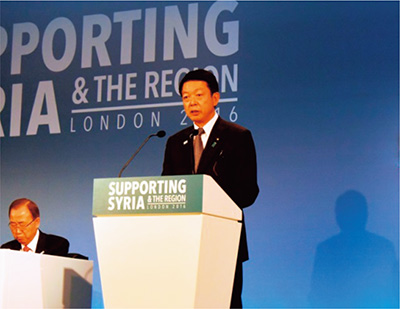Diplomatic Bluebook 2016
Chapter 2
Japan’s Foreign Policy that Takes a Panoramic Perspective of the World Map
2.Syria
The Syrian Arab Republic has seen a continued violent conflict among the Syrian Government, the so-called moderate rebels, the Islamic State of Iraq and the Levant (ISIL), Islamic extremist forces including the Nusra Front, and Kurdish forces. Since September 2014, American troops and other forces have engaged in air raids targeting ISIL, etc., in the territory of Syria, while Russia, requested by the Syrian Government, launched air strikes inside the territory of Syria at the end of September 2015.
To stabilize the situation surrounding Syria, Japan believes the issues have to be basically solved politically in line with the “Geneva Communiqué1.” At the same time, Japan also attaches the importance to continuous support to stave off further aggravation of the situation. From this standpoint, following the aggravated situation in Syria, Japan has provided assistance worth more than 1.2 billion US dollars to Syria, Iraq and neighboring countries by 2015. Since assuming the UN Security Council non-permanent member in 2016, Japan has contributed to the discussion regarding the issue at the UN Security Council. Japan intends to continue its efforts for the improvement and stabilization of the situation surrounding Syria, mainly through humanitarian support which is Japan’s strength in closely coordination together with other members of UN Security Council and the international community.
Regarding humanitarian assistance, the Third International Humanitarian Pledging Conference for Syria (Kuwait III) was held on March 31, 2015, in Kuwait. At the conference Japan announced additional financial assistance of approximately 509 million US dollars in total. This figure includes the yen loan program of the Government of Japan amounting to about 370 million US dollars which is earmarked to improve the infrastructure of local authorities in Turkey, which has been affected by the influx of Syrian refugees. In May, Japan provided a yen loan program amounting to about 200 million US dollars for the stabilization of the economy and finances of Jordan, which has also been affected by the Syrian refugees. While the number of refugees from Syria exceeded four million as of the middle of July, Japan decided to provide assistance of about 12 million US dollars in total to Syrian refugees, internally displaced people, and the host communities by September mainly through international agencies and NGOs in Japan. Furthermore, at the Supporting Syria and the Region Conference held in London in February 2016, Japan made an announcement that it will newly provide assistance amounting to about 350 million US dollars to Syria, Iraq and neighboring states. Amid the prolonged crisis, Japan has provided not only short-term assistance to Syria such as health, hygiene and food, but also mid- to long-term assistance such as education and vocational training for self-reliance of repatriated refugees, improvement of living environment for refugees and host communities and infrastructure development. As Prime Minister Abe stated at the UN General Assembly at the end of September, Japan will work on the assistance through the collaboration between humanitarian and development actors.
 State Minister for Foreign Affairs Muto, announcing a statement at the Supporting Syria and the Region Conference (February 4, 2016, London, UK)
State Minister for Foreign Affairs Muto, announcing a statement at the Supporting Syria and the Region Conference (February 4, 2016, London, UK)- 1 This document was adopted at the Action Group for Syria (“Geneva 1” meeting) on June 30, 2012. It includes the process of administration transition in Syria, including the establishment of a transitional governing body.
The political process in Syria was halted. In 2015, the necessity of a political solution to the crisis in Syria was recognized again in the wake of the influx of many refugees and immigrants including Syrian refugees into Europe, and Russia’s launch of air strikes in Syria. During October and November, several foreign ministers’ meetings regarding on Syria were held in Vienna. In the meeting held on November 14, a statement was released by the International Syria Support Group (ISSG) to ensure political transition led by Syria under the UN. Based on this, an ISSG meeting was held in New York on December 18. On the same day, the UN Security Council resolution 2254, the first resolution regarding a political process after the crisis in Syria, was adopted unanimously. The Resolution requested the Secretary- General to convene representatives from the Syrian Government and the opposition groups to engage in formal negotiation with a target of early January 2016 for the initiation of talks. It also requested the Secretary-General to report to the UN Security Council within one month after the adoption of the Resolution regarding options for ceasefire monitoring, verification, and reporting mechanisms. Thus, it called upon the implementation the Syrian-led political process under the UN based on “Geneva Communique” of June 2012 and the statement by ISSG on November 14, 2015.
The issue of chemical weapons (CW) is handled in accordance with the decision of the Organization for the Prohibition of Chemical Weapons (OPCW) in September 2013 and the UN Security Council Resolution 2118 on September 27. The destruction work was almost complete for the chemical agents and compounds that had been transferred outside Syria by June 2014. The removal work is also close to completion at CW production facilities inside Syria. Chlorine has been used repeatedly as a weapon in Syria. Subject to the UN Security Council Resolution 2235 in August 2015, a UN-OPCW Joint Investigative Mechanism was established to identify persons responsible for use of chemical weapons in Syria.
